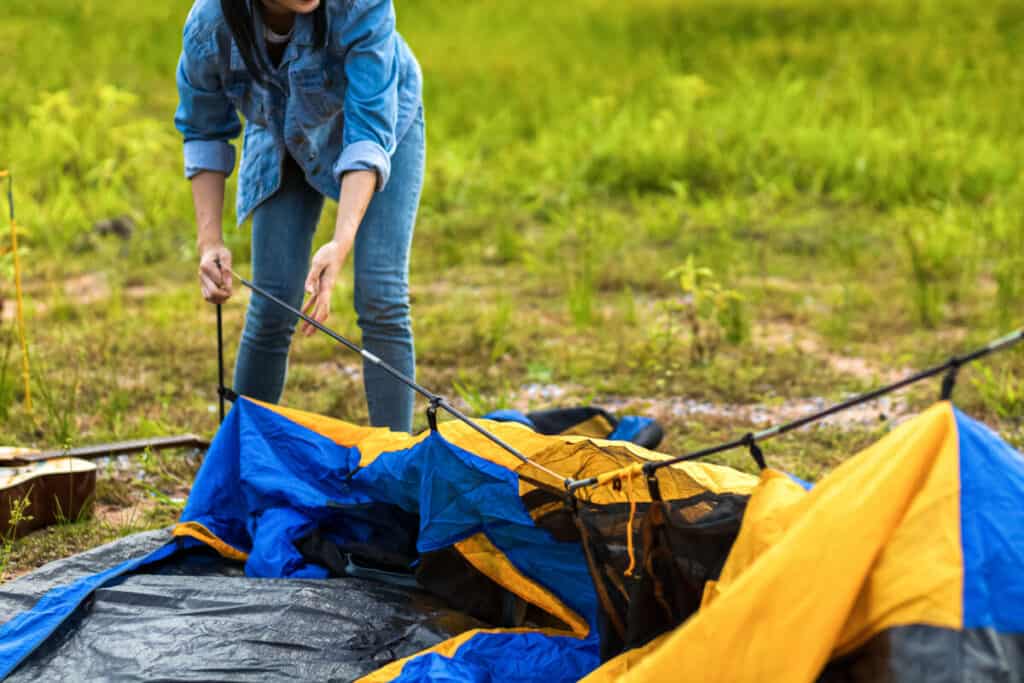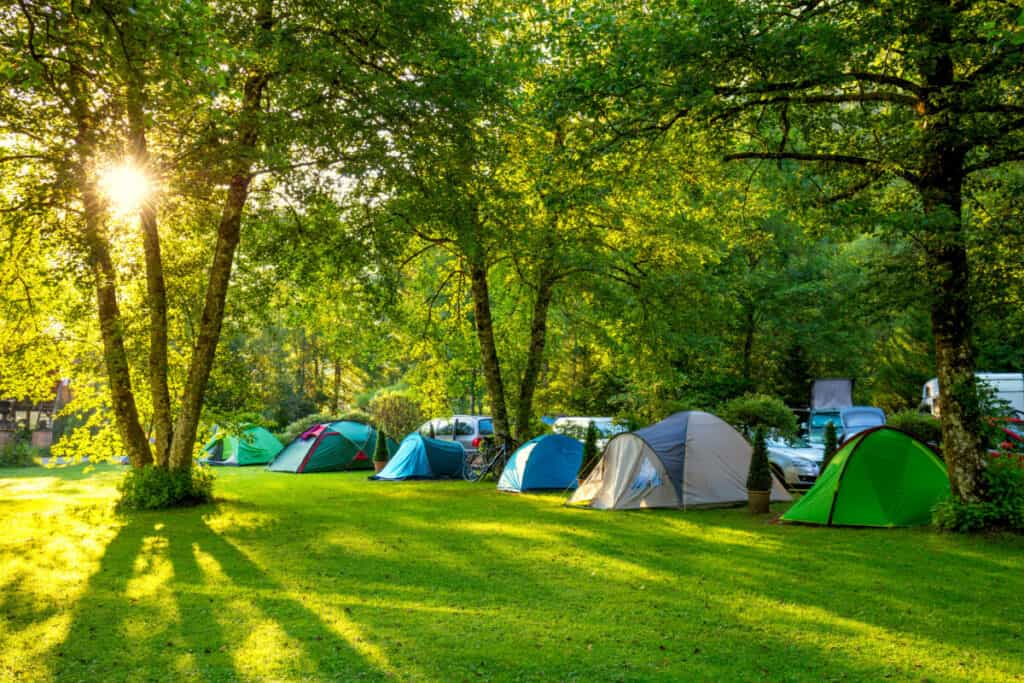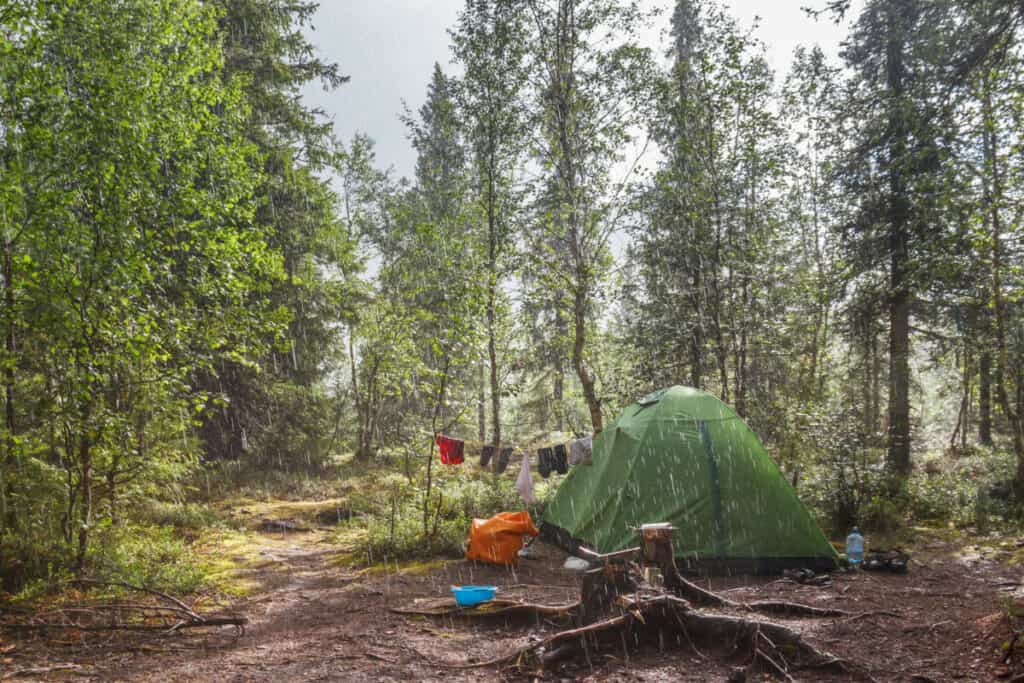
Camping can be a super fun activity, but there are also a lot of opportunities for mistakes. Camping requires a lot of equipment, knowledge, and skills that beginners may neglect to bring or learn. You will probably want to avoid as many mistakes as you can so that you can enjoy your camping trip and not have to deal with a bunch of problems.
Many camping mistakes are common, and beginners may continue making them for a long time. Knowing about the most common camping mistakes can help you to avoid making them and potentially ruining your camping trip. So, here are some of the most common mistakes that people make while camping.
Wearing the Wrong Clothes
When camping, wearing the wrong clothes can, at best, make you a bit uncomfortable. At worst, you may end up sick, sunburnt, blistered, or worse. Living in a tent and spending lots of time outside are going to require different clothes than just lounging around the house or going to work in an office.
The right camping clothes depend on the kind of weather you’re dealing with. Bundle up if it is cold or wear light, loose fitting clothes if it is hot. Layering correctly based on the temperature and level of activity is key. If the weather turns wet, the right rain gear and boots can keep the fun going.
It is also good to make sure that your clothes are comfortable and fit you well. Ill-fitting clothes can make you chafe. Brand new hiking shoes or boots can cause blisters if worn all day.
Finally, wear clothes that are durable and don’t mind getting dirty. You are out in nature, so some of it is bound to end dirtying or even damaging your clothes. Shoes can easily get covered in mud. Pant seams can rip climbing rocks. Shirts can get caught on branches. Don’t bring your designer jeans into the woods with you.
Bringing Too Much
While it is important to be prepared when you go on your camping trip, some people have a tendency to overprepare and bring way too much stuff on the camping trip. It is important that you carefully consider everything that you are planning to bring. Try to only bring things that you are going to need or things that you may need in an emergency. Packing too much stuff can be a big hassle when you start trying to figure out how to find space and transport all of it.
While you’re on a camping trip, it may be a good idea to take note of the things you brought that you didn’t really need. If there is something that you brought that you didn’t need, you may consider leaving it off the packing list next time you go camping. If you go camping frequently, you’ll eventually be able to have a perfect list of all the essential things that you need to bring and know everything that isn’t necessary for you to have while camping.
Experienced backpackers apply these practices and invest in smaller and lighter gear. Backpacking gear can be expensive, but may give you some options if packing for a large family and there just isn’t any room in the car for the giant sleeping bags and tent.
Bringing Too Little
On the other hand, some campers tend to bring too little. Whether it is not packing the right amount of food, batteries, or other things you are going to be using throughout the trip or if you forget some essential items, it is important that you bring everything that you are going to need on your trip. You can find many packing lists for camping online, but not every list is going to have everything that you as an individual need for your trip to a specific campsite.
Chances are, on your first camping trip, you’re going to forget something or find out that there was something you needed that you didn’t think to bring. It’s just important that you don’t forget something very important, such as your tent or your food. Take note of anything that you needed that you didn’t bring so that you can put it on your packing list and remember to bring it next time. A seasoned camper will have a complete list of everything that they need to bring and will run through the essentials list prior to departure.
Not Learning About the Area Beforehand

Before you go camping, make sure you learn about the campground and the area that you are going to be camping in. You should learn about the amenities that the campground has to offer so that you know what you’ll need to bring yourself.
Some campgrounds will have bathrooms, but others won’t. Some campgrounds may have a place for you to store food or even a kitchen that you can use. Electricity is something we take for granted but may or not be available at your site. Learn about the campground because the things that it provides may change your packing list.
If you can, take a look at the campsite and its size and proximity to roads, restrooms, water, trails and other campers. Families with little ones may want to be closer to restrooms for those unexpected emergency trips. Introverts may want to find a spot in the most remote areas for extra peace and privacy.
It is also important to know about the local flora and fauna. If an area has poison ivy or poison oak, you are going to want to know that so you can learn to identify it. Getting poison ivy isn’t fun. You also need to know the best ways to protect yourself and your belongings from wild animals. Some areas may have snakes or bears that you need to take precautions to avoid. It is very important that you are aware of these hazards before you leave so that you can be prepared for them.
Finally, natural events or construction may limit your ability to enjoy the area. It is important to research road closures, trail closures and fire warnings ahead of time to avoid disappointment.
Not Practicing Camping Skills Beforehand
When camping, you’re going to need to know how to light a fire, set up your tent, and a lot of other things that you probably won’t inherently know. The time to learn how these things work is not on your camping trip, but rather beforehand. Learn and practice lighting a fire, making sure that you know what you’re doing and the best practices before you leave.
You also don’t want to figure out how to set up your tent while you’re camping. Figure it out by setting it up in your backyard or a large room in your house. That way you can put it up more quickly and efficiently when you’re out camping. It is also important to set it up before leaving to make sure that it isn’t broken. If you or someone else has used the tent before, you would also want to confirm that the tent is clean and mold free. Mold can grow in a tent if it isn’t aired out properly. In general, you want to make sure all of your essential gear is working and in good condition before you leave for your trip.
Poor Planning for Meals
This is one of the most important mistakes to avoid because making it has very steep consequences. Poor planning of meals can give you food poisoning, leave you hungry with no nearby options, or attract animals into your camp. There are a few poor food planning decisions that beginners often make.
The first of these is not planning out all your meals. You need to make sure that you know what you’re going to be eating and bring enough food for all your meals. The last thing you want is to be stuck in the middle of nowhere without enough food. Testing your camp recipes, camp kitchen and servings prior to your trip is ideal. It’s definitely better to overestimate hunger levels after a day of hiking without the typical snacks that are available at home. A list is important here because it is so easy to forget something. Take the time to visually go through the entire cooking process in your head to avoid forgetting a key kitchen item.
Another food preparation mistake is depending on using a campfire to cook your food. Cooking over a fire is more difficult than it looks, and it can take a long time for your food to cook. Smoke and heat can make the process unpleasant and dangerous. Expect hot spots on a large pan that can lead to unevenly cooked food. The fire may be too hot or not hot enough. You may not be able to light a fire, depending on the weather conditions and current fire rules for that area.
For a beginner, it is best to have a backup plan. Bring a camp stove or just try bringing food that doesn’t need cooking. You also need to make sure that you give your food plenty of time to cook, or you’ll be hungry and waiting to eat dinner well into the night.
You also need to make sure that you store your food correctly so that it doesn’t spoil. Perishable food such as meats, eggs, fruits and vegetables, and dairy products need to be kept at a certain temperature so that bacteria can’t grow in them. Not storing food properly can give you food poisoning, which is even less fun while camping in the middle of nowhere with inadequate bathrooms than it is at home.
The final food preparation mistake that is common is not securing the food properly to keep it safe from animals. You can’t just leave food lying in your tent or out on a picnic table. Food that is left out can attract animals, from small rodents to bears. Racoons are quite good at food theft and can open unsecured coolers. Some campgrounds will have food lockers, bear boxes or other places for you to store your food and water. Other locations will allow you to keep it in your car. More remote locations may require bear cannisters or bear bags hung in a tree. Whatever you do, don’t leave your food in your tent.
Leaving Late in the Day
It may be tempting to leave the packing to the last minute and not get to your campsite until late in the day. This may sound like a good idea because it is one or two fewer meals that you have to pack.
However, you don’t want to get to the campsite too late. Setting up in a new campsite takes a long time, and a lot of the work is difficult and therefore extra stressful to do in the dark. At the very least, the process will take longer. Try to arrive with enough time to get settled in before the sun sets.
Not Checking the Weather

While camping, you are going to be exposed to the whims of the weather, so it is important that you prepare for it. Check the weather in the area where you are going to be camping. Is it going to be below freezing at night? Is it going to rain or snow? Is the temperature going to be hot during the day?
Figure out what kind of weather your campsite is going to see and prepare for it. If it is going to be cold at night, bring extra clothes, a sleeping bag liner and a blanket to stay warmer. Bring sunblock for sunny conditions and bring a raincoat, boots and umbrella if it is going to rain. Not being prepared for the weather you’re going to see can easily result in a very miserable trip. Some locations can see extreme conditions from day to night or from high to low elevations, so do not forget to research those in places like the Grand Canyon.
Not Bringing the Right Kind or Enough Firewood
Many beginning campers don’t know this, but you actually shouldn’t bring your firewood from home unless you live near the campsite. Firewood can have a lot of insects in it. When you bring your own firewood from far away, it can release these bugs into the environment. The area may not have pests like that, so the insects can actually become an invasive species, throwing off the ecosystem and threatening natural resources and agriculture.
You should never bring firewood that is from over 50 miles away from the campsite. Ideally, you should only bring it from somewhere less than 10 miles away. Collect firewood from your campsite (if allowed) or purchase some from the camp or a local store. You can also bring compressed wood, pellets, or heat-treated wood because those don’t contain pests.
Pitching Tent in the Wrong Place
You can’t just set up a tent anywhere. Tents need to be set up on level ground. If your tent is at an angle, you will end up rolling or sliding downward, even on minor slopes. You also need to make sure that there aren’t any rocks, sticks or lumps beneath the tent because those can damage your tent floor or puncture your air mattress. Not setting up your tent on level, smooth ground can make for a miserable night of poor sleep.
Also make sure not to pitch your tent at the bottom of a hill. If it rains, water is going to rush down toward your tent, and it may pool right where you are sleeping. Most tents are designed to be waterproof, but if enough water pools under them, that won’t matter very much; it’s going to get in there. Water in your tent can be a disaster, especially in cold conditions.
Not Airing Out Gear
Once your camping trip is over and you get back home, it is important to resist the urge to immediately store your gear away. Pull out your tent, sleeping bag, and any other gear and leave it out to air out for a while. This is especially important if your camping gear has gotten wet. Packing away wet camping gear can cause mold to grow, which will ruin it. You probably want to be able to use your tent again, so it is important to air it out before you pack it up for your next camping adventure.
